Intensive Pine Plantation Management Effects
on Wintering and Breeding Avian Communities
and Small Mammal Communities of the Lower
Coastal Plain
Principal Investigators
Dr. Steve Demarais
Mississippi State University Department of Wildlife and Fisheries
Dr. Jeanne Jones
Mississippi State University Department of Wildlife and Fisheries
Graduate Research Assistants
Scott L. Edwards
Mississippi State University Department of Wildlife and Fisheries (2001-2004)
Phillip Hanberry
Mississippi State University Department of Wildlife and Fisheries (2001-2005)
Brice B. Hanberry
Mississippi State University Department of Wildlife and Fisheries (2004-2007)
Tamara Campbell
Mississippi State University Department of Wildlife and Fisheries (2008-present)
Timber production in the southeastern United States is a multi-billion dollar industry, and an increasing amount of fiber production has been focused on intensively managed pine plantations. Financial considerations and concerns about future timber supplies are driving a trend toward more intensively managed pine plantations.
Expanding use of herbicide mixtures during pine stand establishment (or site preparation) to improve pine plantation productivity has generated environmental concerns among some environmental groups, private landowners, the general public, and wildlife biologists. Concerns over intensive timber management practices led to efforts to identify issues and to prioritize research efforts. Biologists representing the timber industry, private foundations, universities, and wildlife agencies throughout the Southeast discussed these issues at the "Intensive Forest Management and Wildlife Workshop" November 10, 1999. This group identified the need to quantify the response of vegetation and wildlife to herbicide mixtures and to evaluate new approaches which might minimize vegetative and wildlife impacts while allowing continued improvement in pine plantation productivity.
Quantifying relationships between pine plantation management intensity and wildlife habitat quality will facilitate land management decisions that optimize economic returns while giving consideration to wildlife values. Optimizing timber production while balancing demands for wildlife conservation and environmental integrity is a major issue to landowners and citizens in the Southeast.
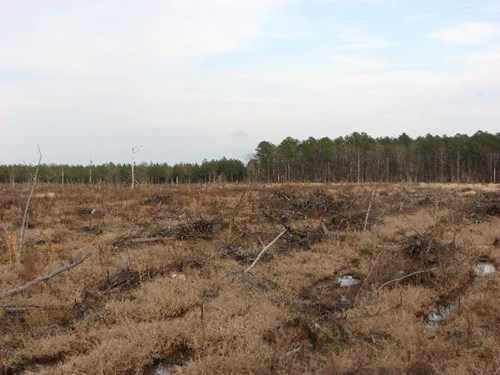
The intensity of site preparation methods used to establish pine plantations impacts wildlife habitat quality; these impacts can be good and bad, and often change over time. This research project was designed to determine an operational balance between timber production and providing wildlife habitat, especially songbird and small mammal habitat.
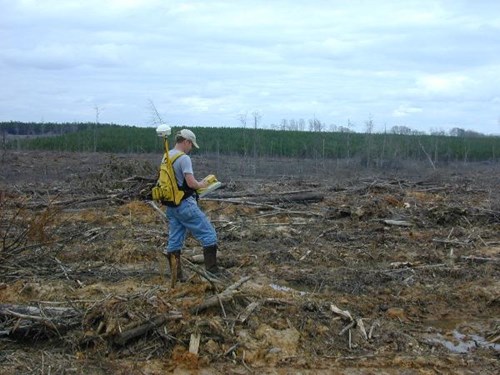
Graduate student Phillip Hanberry uses a GPS to mark bird sampling point locations on a study site.
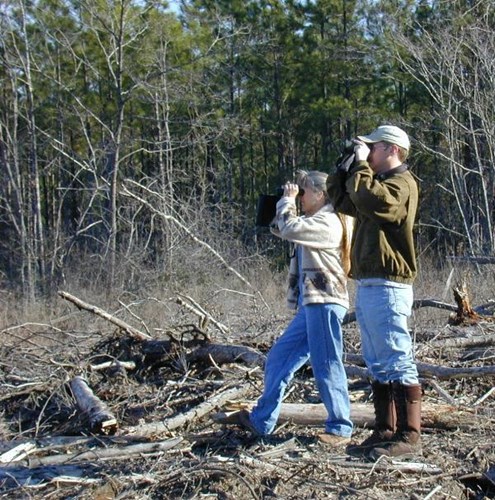
MSU professor Dr. Jeanne Jones and graduate student Phillip Hanberry observe birds to determine which species of birds use treatment areas during winter and spring.
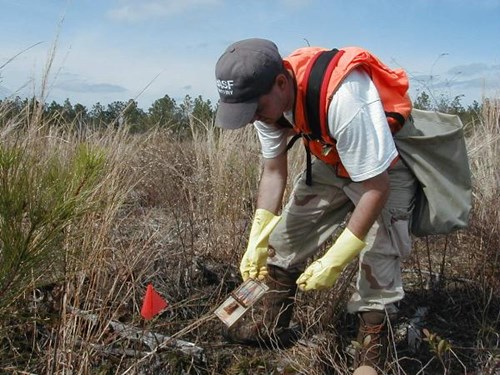
Graduate student Scott Edwards traps small mammals to determine which species and how many rodents use treatment areas.
Hanberry, B. B. 2007. Birds and small mammals, intensively established pine plantations, and landscape metrics of the Coastal Plain. Dissertation, Mississippi State University. Download
Hanberry, P. 2005. Effects of intensive pine plantation management on wintering and breeding avian communities in southern Mississippi. Thesis, Mississippi State University. Download
Edwards, S. L. 2004. Effects of intensive pine plantation management on wildlife habitat quality in southern Mississippi. Thesis, Mississippi State University. Download
Funding for this project was provided by:
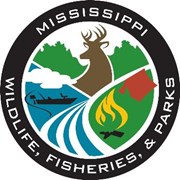 |
 |
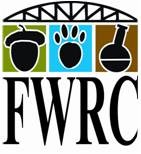 |
 |
 |
 |
 |
 |









